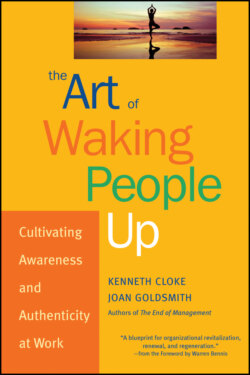Читать книгу The Art of Waking People Up - Kenneth Cloke - Страница 16
Preface
ОглавлениеI have often thought that the best way to define a man’s character would be to seek out the particular mental or moral attitude in which, when it came upon him, he felt himself most deeply and intensively active and alive. At such moments, there is a voice inside which speaks and says, “This is the real me.”
William James
Being “deeply and intensely active and alive” is not only, as philosopher William James describes, the best way of defining our characters, it is how we create them. Our characters, along with our attitudes, ideas, emotions, bodies, and spirits, are molded not simply by the events we experience but also by the ways we experience them. As a result, the more awake we are, the more we define and create ourselves as aware and authentic human beings.
Why, then, do millions of employees arrive at work every day and immediately slip into a hypnotic, semicomatose state? Why do they become spectators and passive observers of their own work lives? Why do they show up only in order to receive a paycheck and begin their “real” lives only when work is over? By failing to be deeply and intensely alive, employees lose their passion and love of what they do. They become cautious and frightened of losing jobs they secretly loathe, or do not care about, or have given up on, or barely tolerate. They grumble and complain, yet feel trapped and unable either to improve their working conditions or leave and find better ones. They become miserable and depressed and engage in pointless conflicts, destructive gossip, and petty personal rivalries. They feel put upon, harassed, overworked, and underpaid. As a result, they slowly die somewhere deep inside. Ultimately, they stop caring and simply wait for weekends, holidays, sick leave, retirement, and death.
Why do so many employees become inactive, inauthentic, apathetic, and unclear about who they are at work? Why is it so easy to get lost in passivity, anesthetized surrender, lethargy, cynicism, apathy, and doubt? What in our workplaces induces this hibernation of the soul? Why do so many people remain in this state for most of their working lives? What can be done to wake them up and cultivate their awareness and authenticity at work?
Ask yourself: What percentage of my working life and that of my coworkers is spent being “deeply and intensely active and alive”? What percentage is spent on autopilot, operating in a fog or haze? How often am I fully awake and using all my potential and how often am I sleepwalking or doing only what is minimally required? What percentage of my working day is spent fully in the present and how much is spent recalling the past or fantasizing about the future? On a scale of 1 to 10, with 10 being highest, how committed am I to making a difference? How much of myself do I bring to my work, and how much of me is playing a role or hiding behind a mask? Even if I bring 90 percent of myself to work, what would happen to me, my coworkers, and my work if I were able to bring that extra 10 percent?
If we never face these questions, we may fail to realize that what we produce at work are not simply products and services but the processes, relationships, and social and organizational environments in and by which they are created. Most important, we create ourselves by the things we do, the ways we do them, the people with whom we do them, the environments in which we do them, and the attitudes we bring to doing them. The best way to become an aware, authentic person is to practice being awake and alive eight hours a day every day at work.
It is therefore a matter of personal and not merely organizational importance that we decide to wake up, choose who we want to be, and practice being that person every moment of every working day. Our characters and personal lives depend on our capacity to be active and alive, aware and authentic, congruent and committed at work. Yet we cannot achieve these personal goals without actively transforming the organizational structures, systems, cultures, processes, and techniques that put people to sleep and turn them into automatons or objects to satisfy corporate or bureaucratic ends.
Waking up is not effortless or risk-free. As we do so, we are compelled to honestly examine our choices, styles, and patterns; elicit tough, painful feedback from others; critically assess our commitments and the results we produce; and actively participate in critiquing and transforming the dysfunctional conditions under which we work. We are invited to grow up, take responsibility for everything and everyone we encounter, increase our skills, and deepen the honesty and empathy of our communications and relationships with others. We are asked to be fully present in every moment, including the painful, disappointing ones we would prefer not to experience.
If waking up is risky, arduous, and time consuming, why bother? Waking up allows us to reconnect our passion and values with our work. We are able to contribute more to others and create something larger than ourselves. We can learn, stretch, grow, and transform failures into successes. We can develop strategies for improving or transforming our work environments and making our organizations more collaborative and democratic. Most important, waking up allows us to define and create ourselves as active and alive human beings.
